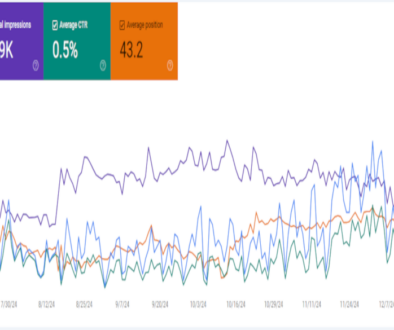From Seeds To Leads: Mastering SEO For Landscape Professionals
Are you struggling to attract new clients to your landscaping business? Many landscape professionals face challenges in getting found online. SEO can help landscapers increase their visibility in search results and reach more potential customers.
This article will show you practical ways to improve your website’s SEO and grow your landscaping business. Ready to turn those seeds into leads? Read how with our SEO for landscaping professionals guide.
Key Takeaways
- SEO helps landscape businesses grow by boosting online visibility and attracting more customers through improved search engine rankings.
- Effective SEO strategies for landscapers include keyword research, optimizing website content, enhancing mobile-friendliness, building quality backlinks, and leveraging social media platforms.
- Local SEO tactics like claiming Google Business Profiles, using location-specific keywords, and encouraging customer reviews are crucial for attracting nearby clients.
- Technical website optimizations such as improving page load speed, implementing HTTPS, and fixing errors can significantly improve search rankings and user experience.
- Regularly monitoring and adjusting SEO strategies using tools like Google Analytics and Search Console helps landscapers stay competitive and visible online.
Understanding SEO for Landscape Business Growth
SEO helps landscape businesses grow online. It boosts visibility and attracts more customers to your services.
Defining SEO for Landscapers
SEO for landscapers is the process of optimizing a landscaping business’s online presence to rank higher in search engine results. It involves using specific keywords, creating quality content, and improving website structure to attract more potential customers.
Landscaping professionals use SEO techniques to boost their visibility on platforms like Google, Bing, and Yahoo.
Effective SEO for landscape contractors focuses on local search optimization, mobile-friendly design, and relevant content creation. These strategies help landscaping businesses appear in local searches, improve their Google My Business listings, and showcase their services effectively online.
By mastering SEO, landscape artists can grow their client base and stand out from competitors in the digital marketplace.
Why SEO is Essential for Landscape Professionals
SEO plays a crucial role in the success of landscape businesses. It helps these companies reach their target audience effectively. Through proper optimization, landscapers can improve their visibility on search engines like Google.
This increased visibility leads to more website traffic and potential customers.
Effective SEO strategies give landscape professionals a competitive edge. They can showcase their expertise and services to a wider audience. SEO also builds credibility and trust with potential clients.
By appearing at the top of search results, landscapers establish themselves as industry leaders. This digital presence often translates into more leads and higher conversion rates.
SEO is the compass that guides potential clients to your landscaping oasis in the vast digital desert.
Exploring Types of SEO for Landscapers
Landscapers can use various types of SEO to boost their online presence. These strategies help attract more clients and grow their business.
- On-Page SEO: This focuses on optimizing individual web pages to rank higher in search results. Landscapers can improve their on-page SEO by:
- Using relevant keywords in page titles, headers, and content
- Creating high-quality, informative content about landscaping services
- Optimizing meta descriptions and alt tags for images
- Ensuring fast page load times for better user experience
- Off-Page SEO: This involves actions taken outside of a landscaper’s website to improve search rankings. Key off-page SEO tactics include:
- Building backlinks from reputable gardening and home improvement sites
- Getting listed in online directories for local landscaping businesses
- Encouraging customer reviews on Google My Business and other platforms
- Engaging with customers on social media platforms like Facebook and Instagram
- Technical SEO: This type focuses on the backend of a landscaper’s website. Important technical SEO elements are:
- Creating an XML sitemap for easy crawling by search engines
- Implementing HTTPS for secure browsing
- Optimizing website structure and internal linking
- Fixing broken links and redirects
- Local SEO: This is crucial for landscapers serving specific geographic areas. Local SEO strategies include:
- Claiming and optimizing Google My Business listings
- Including location-specific keywords in website content
- Getting listed in local business directories
- Encouraging customers to leave reviews on local platforms
- Mobile SEO: With more people using smartphones to search for services, mobile optimization is vital. Landscapers should focus on:
- Creating a responsive website design that works well on all devices
- Optimizing page load speed for mobile users
- Using mobile-friendly content formats like short paragraphs and bulleted lists
- Implementing click-to-call buttons for easy contact on mobile devices
Implementing Effective SEO Strategies for Landscaping Professionals
Effective SEO strategies can boost your landscaping business online. These methods help you reach more potential customers and grow your company.
Conduct Keyword Research and Optimization
Keyword research and optimization form the foundation of effective SEO for landscape professionals. This process helps identify the terms potential clients use when searching for landscaping services online.
- Use Google Keyword Planner to find relevant search terms. This tool shows average monthly searches and competition levels for different keywords.
- Analyze competitor websites to discover keywords they target. Tools like SEMrush can reveal the phrases driving traffic to rival landscaping businesses.
- Focus on long-tail keywords specific to landscaping services. Examples include “drought-resistant garden design” or “eco-friendly lawn care near me.”
- Incorporate local keywords to attract nearby customers. Add city names or neighborhoods to your target phrases, like “landscape architect in [City Name].”
- Optimize your website’s content with chosen keywords. Place them naturally in page titles, headings, meta descriptions, and body text.
- Create content around popular landscaping topics. Blog posts, videos, or infographics addressing common questions can boost organic search rankings.
- Monitor keyword performance using Google Analytics. Track which terms bring the most traffic and leads to your landscaping website.
- Adjust your keyword strategy based on results. Remove underperforming terms and focus on those driving quality traffic to your site.
- Stay updated on seasonal landscaping trends. Adapt your keyword targets to match changing customer interests throughout the year.
- Leverage Google’s “People Also Ask” feature for content ideas. This section reveals related questions users have about landscaping topics.
Optimize Website Content for Landscapers
Optimizing website content is crucial for landscapers to attract potential clients. Here are key strategies to enhance your landscaping website’s content:
- Create compelling, informative pages about your services
- Detail your lawn care, garden design, and hardscaping offerings
- Include high-quality photos of your past projects
- Describe your expertise and unique selling points
- Develop location-specific landing pages
- Target nearby cities and neighborhoods you serve
- Include local landmarks and regional plant recommendations
- Optimize for “[city] landscaping services” keywords
- Start a landscaping blog with useful tips
- Write about seasonal lawn care, plant selection, and outdoor living ideas
- Answer common customer questions in your posts
- Use relevant keywords naturally throughout your articles
- Optimize title tags and meta descriptions
- Include your business name and main services
- Keep titles under 60 characters and descriptions under 160
- Use action words to encourage clicks from search results
- Add schema markup to your website
- Implement LocalBusiness and Service schemas
- Include your business info, hours, and service area
- Help search engines better understand your content
- Showcase customer reviews and testimonials
- Display positive feedback from satisfied clients
- Include before and after photos when possible
- Build trust with potential customers browsing your site
- Create service-specific content pages
- Dedicate pages to landscape design, irrigation, tree care, etc.
- Include detailed information about your processes and materials
- Optimize each page for relevant long-tail keywords
- Use clear, concise language throughout your site
- Avoid jargon and explain technical terms
- Write in short paragraphs with descriptive headers
- Make your content easy to scan and understand
- Include clear calls-to-action (CTAs)
- Prompt visitors to request a quote or schedule a consultation
- Use action-oriented language like “Get a Free Estimate”
- Place CTAs prominently on each page
- Optimize images with descriptive alt text
- Use keywords in file names and alt tags
- Describe the image content accurately
- Help visually impaired users and improve SEO
Enhance Mobile Friendliness for Better Reach
Mobile-friendly websites are crucial for landscape professionals. Google prioritizes mobile-optimized sites in search results. A responsive design adapts to different screen sizes, improving user experience.
Fast loading times on mobile devices boost SEO rankings and reduce bounce rates. Landscape businesses must ensure their sites work well on smartphones and tablets.
To enhance mobile friendliness, simplify navigation and use larger fonts. Optimize images for quick loading on cellular networks. Test your site across various devices and browsers.
Remove pop-ups that hinder mobile viewing. These steps will improve your site’s reach and visibility to potential landscape clients searching on mobile devices.
Develop Link Building Strategies
Link building strategies are crucial for improving your landscaping website’s search engine rankings. These techniques help establish your site’s authority and credibility in the eyes of search engines.
- Create high-quality content: Produce informative blog posts, guides, and videos about landscaping topics. This attracts natural backlinks from other websites in the industry.
- Guest blogging: Write articles for reputable landscaping or home improvement websites. Include a link back to your site in your author bio or within the content.
- Local business directories: List your landscaping company in online directories like Yelp, Google My Business, and Yellow Pages. These provide valuable backlinks and improve local SEO.
- Collaborate with suppliers: Partner with plant nurseries, equipment manufacturers, or other landscaping suppliers. Exchange links on each other’s websites to boost credibility.
- Testimonials and reviews: Encourage satisfied clients to leave reviews on your Google My Business page and other platforms. These often include links back to your site.
- Social media engagement: Share your content on platforms like Facebook, Instagram, and LinkedIn. This increases visibility and encourages others to link to your posts.
- Broken link building: Find broken links on relevant websites and offer your content as a replacement. This helps webmasters fix their sites while earning you a backlink.
- Resource page outreach: Identify resource pages in the landscaping niche and reach out to site owners. Ask them to include your valuable content as a resource.
- Infographic creation and distribution: Design informative infographics about landscaping topics. Share them on social media and infographic directories to attract backlinks.
- Industry associations: Join local or national landscaping associations. Many offer member directories with links to your website, boosting your online presence.
Leverage Social Media for Landscaping Professionals
Social media platforms offer landscapers powerful tools to showcase their work and connect with potential clients. Instagram and Pinterest are ideal for sharing stunning before-and-after photos of garden transformations.
Facebook groups can help landscapers network with local homeowners and offer expert advice. Twitter allows quick updates on seasonal services or special promotions.
Landscaping businesses can boost their online presence through strategic social media use. Regular posts featuring completed projects, gardening tips, and team highlights keep followers engaged.
User-generated content, like customer reviews or photos of their newly landscaped yards, builds trust and credibility. Paid social ads can target specific demographics in local areas, driving more qualified leads to the business.
Advanced Techniques to Boost Landscaping SEO
Ready to take your landscaping SEO to the next level? These advanced techniques will help you stand out in search results and attract more leads.
Apply Local SEO Tactics for Landscapers
Local SEO tactics are crucial for landscapers to attract nearby customers. These strategies help businesses appear in local search results and Google Maps.
- Claim and optimize Google Business Profile: Set up a complete profile with accurate business information, photos, and services offered.
- Use location-specific keywords: Include city names and local landmarks in website content and meta tags.
- Create location pages: Develop separate pages for each service area, highlighting local projects and testimonials.
- Get local citations: List your business on relevant directories like Yelp, Yellow Pages, and industry-specific platforms.
- Encourage customer reviews: Ask satisfied clients to leave reviews on Google, Yelp, and other platforms to boost credibility.
- Optimize for voice search: Focus on natural language phrases people might use when asking for landscaping services.
- Build local backlinks: Partner with local businesses, sponsor events, or join chambers of commerce to gain quality links.
- Use schema markup: Implement structured data to help search engines understand your business information better.
- Create local content: Publish blog posts about local gardening tips, plant species, or landscaping trends in your area.
- Leverage social media: Share local projects, engage with community pages, and use location-based hashtags on platforms like Instagram and Facebook.
These local SEO tactics will help landscapers improve their online visibility and attract more leads. The next section explores technical website optimizations for even better search engine performance.
Perform Technical Website Optimizations
Moving from local SEO tactics, we now focus on technical website optimizations. These improvements boost your site’s performance and search engine rankings.
- Speed up page load times:
- Compress images and use modern formats like WebP
- Minify CSS, JavaScript, and HTML files
- Leverage browser caching to store static files
- Use a content delivery network (CDN) for faster global access
- Implement HTTPS:
- Install an SSL certificate to encrypt data transfer
- Redirect HTTP traffic to HTTPS for improved security
- Update internal links to use HTTPS protocol
- Optimize for mobile devices:
- Use responsive design to adapt to different screen sizes
- Ensure text is readable without zooming
- Make buttons and links easy to tap on touchscreens
- Improve site structure:
- Create a clear hierarchy with logical URL structure
- Use XML sitemaps to help search engines crawl your site
- Implement breadcrumbs for easy navigation
- Fix technical errors:
- Resolve broken links and 404 errors
- Eliminate duplicate content issues
- Fix crawl errors reported in Google Search Console
- Enhance site performance:
- Optimize database queries for faster data retrieval
- Use lazy loading for images and videos
- Minimize server response time through efficient coding
- Implement structured data:
- Use schema markup to provide context about your content
- Add rich snippets for enhanced search results display
- Include local business schema for improved local SEO
- Optimize for voice search:
- Use natural language in content and metadata
- Focus on long-tail keywords and question-based queries
- Implement FAQ schema for featured snippet opportunities
Promote Through Social Media Platforms
Social media platforms offer powerful tools for landscapers to boost their SEO efforts. Facebook, Instagram, and Pinterest provide ideal spaces to showcase stunning landscape designs and completed projects.
Regular posts with high-quality images and relevant hashtags can increase visibility and drive traffic to your website. LinkedIn serves as a valuable platform for B2B connections, allowing landscapers to network with potential commercial clients and share industry insights.
Twitter enables quick updates and engagement with followers, while YouTube offers a chance to create video content showcasing landscaping techniques or garden tours. By consistently sharing valuable content across these platforms, landscapers can build brand awareness, improve search rankings, and attract more leads.
Each social media channel presents unique opportunities to connect with different audience segments and enhance overall online presence.
Monitor and Adjust SEO Strategies
SEO strategies need constant attention and refinement. Monitoring and adjusting your approach ensures your landscaping business stays visible online.
- Track keyword rankings: Use tools like Google Search Console to check how your pages rank for target keywords. Adjust content if rankings drop.
- Analyze website traffic: Review Google Analytics data to spot trends in visitor numbers and behavior. Identify high-performing pages and optimize underperforming ones.
- Check backlink profile: Monitor incoming links using tools like Ahrefs. Remove toxic links and seek new quality backlinks to boost authority.
- Update content regularly: Refresh older blog posts and service pages with new information. This signals to search engines that your site is current.
- Watch competitor activity: Keep an eye on rival landscapers’ SEO tactics. Adapt successful strategies to your own site.
- Test page loading speeds: Use Google PageSpeed Insights to identify slow-loading pages. Fix technical issues to improve user experience and rankings.
- Monitor online reviews: Respond to customer feedback on Google My Business and other platforms. Positive reviews can boost local SEO.
- Adjust for algorithm updates: Stay informed about Google’s algorithm changes. Tweak your SEO approach to align with new ranking factors.
- Track conversion rates: Measure how many visitors become leads or customers. Optimize pages with low conversion rates to improve ROI.
- Analyze mobile performance: Ensure your site works well on smartphones and tablets. Fix any mobile usability issues flagged in Search Console.
Conclusion
Mastering SEO for landscape professionals opens up new growth opportunities. Effective strategies boost online visibility and attract more leads. Regular monitoring and adjustments keep your business ahead of competitors.
With the right approach, landscape companies can thrive in the digital marketplace. Start implementing these tactics today to see your business bloom online.
FAQs
1. What is SEO for landscape professionals?
SEO for landscaping contractors is a digital marketing strategy. It helps improve their online visibility. This boosts their ranking on search engine results pages.
2. How can landscape artists benefit from SEO?
Landscape artists can gain a competitive advantage through SEO. It increases their discoverability online. This leads to more clicks and potential clients.
3. What tools can landscape technicians use for SEO?
Landscape technicians can use tools like Yoast for WordPress. Google Ads and Google AdWords are also helpful. These tools aid in keyword optimization and improve click-through rates.
4. Why is user intent important in SEO for landscaping?
User intent helps create user-friendly content. It ensures your website matches what people search for. This improves your site’s reputation and search engine ranking.
5. How can social media help with SEO for landscapers?
Social networks boost SEO efforts. They increase buzz around your business. Social media campaigns can drive traffic to your optimized website.
6. What are some SEO mistakes landscapers should avoid?
Landscapers should avoid keyword stuffing. It’s also crucial to prevent malware attacks. Using proper server-side redirects is important. These practices help maintain good standing with search engines.



